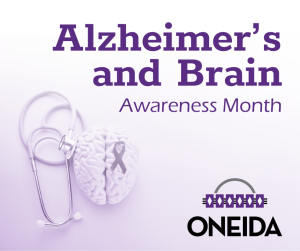Alzheimer’s and Brain Awareness Month

June is Alzheimer’s and Brain Awareness Month—a vital time to reflect on the importance of brain health and early detection of memory-related conditions. At Oneida Comprehensive Health Division, we are proud to offer a variety of resources to support individuals living with memory loss, as well as their families and caregivers. With a dedicated Tribal Dementia Ca
re Specialist, we provide the background you need to recognize the early signs and support your loved ones every step of the way. This month, we hope to highlight how important it is to care for our minds along with our bodies.
The Importance of Early Detection
Identifying dementia in its early stages can make a meaningful difference in the quality of life for individuals and their families. When cognitive function is still relatively high, there is more time to:
• Develop a personalized care plan
• Make informed decisions about living arrangements
• Enjoy meaningful activities and relationships
• Explore treatment options that may be more effective early in the disease’s progression
Certain medications, for example, work best when started in the early stages of dementia. Early diagnosis increases the chance that these interventions maintain a longer quality of life.
Recognizing the Signs
It’s important to understand the difference between occasional forgetfulness, other health concerns and signs of dementia. Typical forgetfulness might include missing an appointment or misplacing keys, whereas early signs of dementia might look like getting lost in familiar places, being unable to retrace steps to find a lost item or withdrawing from social situations.
Other signs may include a noticeable decline in executive functioning. This can look like struggling to complete everyday tasks or activities that once came easily. If a loved one begins to avoid hobbies, family events or conversations because they feel too overwhelmed or confused, it might be time to speak with your healthcare provider.
Seeking Medical Guidance
Talking to a doctor is crucial: some symptoms that look like dementia may be caused by other conditions, such as infections or medication side effects, which can be treated and managed. A professional evaluation can rule out other causes and lead to the right support.
Culturally Inclusive Care
At Oneida Comprehensive Health Division, we are committed to providing holistic, culturally-sensitive care that honors Tribal values and beliefs. In memory care, this includes involving family members in the care process, recognizing that healing happens within the context of community.
Support and Resources for Caregivers
If you are a caregiver for someone with dementia, know that your well-being matters too. Caring for yourself physically, emotionally and mentally ensures that you can continue to care for others in a sustainable way. Asking for outside help is more than okay—it’s necessary.
We also offer wraparound services including our Memory Café, which is a welcoming space where individuals living with memory loss and their caregivers can connect with others on a similar journey. Additional resources include access to support groups, educational events and community programs designed to foster understanding, connection and hope.
For more information, please contact our Tribal Dementia Care Specialist:
Debra Miller, BSW, CSW
Tribal Dementia Care Specialist
Dmiller4@oneidanation.org
(920) 869-4854
06092025






